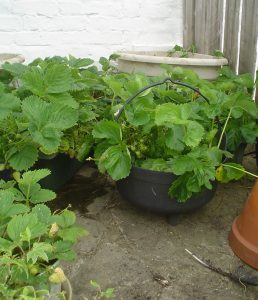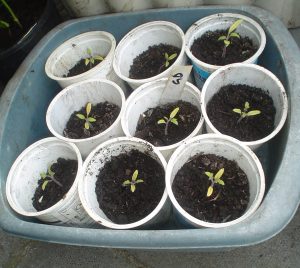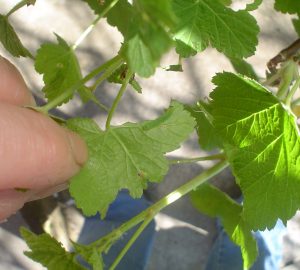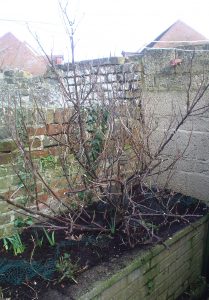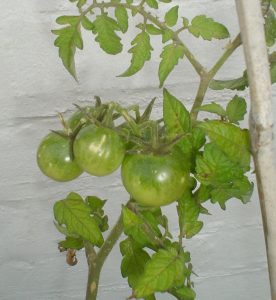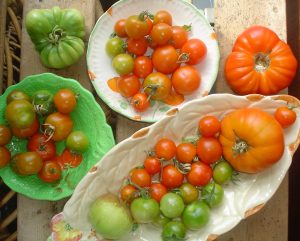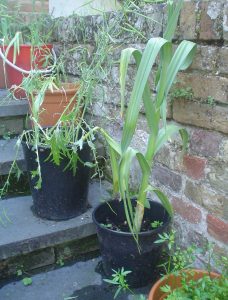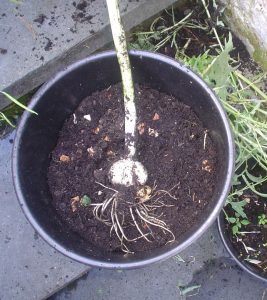And now for a bit of good news: strawberries. Nom nom nom
Well, my tomatoes might be a washout but the strawberries out the front are going really well. I have already eaten my first few; they taste fab even when they’re not quite ripe.
The big pot in the back of the pic is one of three runner bean containers that I potted up today. I didn’t plant any runner bean seeds – it was one of my neighbours (who lives round the corner from us). He had more seedlings than he knew what to do with, and gave me some of his surplus. There are two big bean pots out the front, and one in the back. It’s on the top step by the back door, because that’s the only spot in our back garden where they stand an earthly against the monstrous horde of snails.
Categories: crops, slugs & snails Tags: runner beans, strawberries
Sad tomato seedlings are very, very sad
So… I planted tomato seeds indoors in the third week of April. The next month or so was unseasonably cold, which might explain why my tomato seeds have germinated but have “failed to launch”, so to speak. Now that the weather is a lot warmer I’ve potted them up and have put them outside. They can sink or swim – survival of the fittest. I’ve already bought a few tomato plants from a local bring and buy sale, and will probably buy more because I don’t think my own plants are going to go anywhere.
Here they are… they are sad, to say the least.
What’s eating our redcurrants. Update #4
Well, the manure didn’t work (see this post) – about ten days ago, I realised that once again, my redcurrants were being eaten alive. Last Sunday, I started the offensive against the culprit, namely these little critters (sawfly larvae):
There were hundreds of them. It needed several hour-long sessions to kill the majority, which I achieved by donning a pair of rubber gloves and squishing them between my thumb and forefinger. They could mostly be found at the edges of the leaves, methodically chewing their way to the centre. I will venture out with the Marigolds again tomorrow morning.
On a brighter note, the strawberry containers in the front are doing well.
Categories: crops, other pests Tags: redcurrants, sawfly
What’s eating our redcurrants. Update #3
I ordered my usual three 70 litre bags of compost from Local Hardware Store during the week, and remembered to add a couple of bags of well-rotted horse manure to my order. So there’s now a layer of it sitting on the soil around my redcurrant bushes:
This is a follow on from my last post, where I’d discussed the sawfly problem with a fellow gardener. I also had a go at a bit of light pruning, clipping off any diseased twigs and removing one or two big branches that were rubbing up against other branches and generally getting in the way. But frankly I still don’t feel I know what I’m doing when it comes to pruning redcurrants.
The next stage is to wait till the leaves come out, and pick off any larvae that I find from the undersides. Hopefully most of them won’t have made it that far, thanks to the manure.
Encouraged by today’s lovely weather, I also turned over the compost heap, picked off surplus figs from the fig tree and divided the sorrel (grows in a black bucket, not visible in the above pic).
Categories: compost, crops, other pests, pruning Tags: compost, fig tree, figs, horse manure, manure, redcurrants, sawfly, sorrel
What’s eating our redcurrants? Update #2
I had a great conversation with another vegetable grower the other week, over a game of bowls. I mentioned my sawfly/redcurrant problem (see this post), and she gave me the following tip: horse manure. Stick a layer of horse manure over the soil (in early spring, I think she said), and the sawfly larvae will have a much harder job to emerge and plunder your redcurrant bushes. Something to think about.
Categories: crops, other pests Tags: redcurrants, sawfly
What’s eating my tomatoes? (Flea beetle. I think.)
Earlier this week, I was congratulating myself that my tomato crop had been a reasonably good one, especially considering the fact that the summer had such a slow start. However, today I noticed something that shook me out of my complacency a bit – many of my tomato plants had tiny “nibbles” on the skin of the fruit and also on the stems/leaves. The pic below shows an example (click for biggering).
A bit of googling came up with a possible culprit: the flea beetle. I have ordered some yellow sticky sheets off eBay so hopefully I can catch some of the little barstewards and ID them conclusively. I will have to be careful about not re-using the tomato compost, because apparently the flea beetle overwinters in the soil where the affected crop grows. (Maybe I can dump it by the rose bushes in the front garden, well away from any vegetable plants.)
Categories: crops, other pests Tags: tomatoes
Elephant garlic update (2)
Back in June (see this post), I reported on how some of my elephant garlic plants were doing really well, while others… weren’t. These had failed to thrive and had succumbed to our garden’s massive snail population before they had a chance to flower. The failed garlics one thing in common: they were the plants where I’d grown mizuna in the pot as a companion crop. I think it would have been OK if I’d taken the mizuna out the moment it started to bolt, but I left it in there and I think it probably sucked all the nutrients out of the compost, thus weakening the garlic plants.
The “mizuna garlic” bulbs never ripened off properly – they remained as undifferentiated globes. The healthy garlic plants (the ones with no mizuna) remained undamaged by snails and flowered as you’d expect. When I pulled them up in mid-August, the bulbs had matured and split into lovely big cloves. Which taste fab. (The “globes” are OK to eat as well. At least, we haven’t suffered any ill effects.)
Conclusion? Ten inch pots are fine for growing elephant garlic, provided you pull up any companion crops before they have a chance to weaken the garlic.
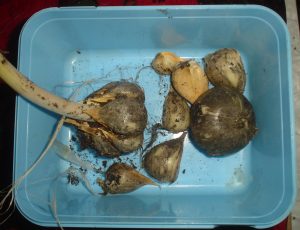
Elephant garlic harvest showing “non mizuna” and “mizuna” bulbs
Categories: crops Tags: elephant garlic
Tomato time
It’s the second week in September, and the tomatoes are *just* hitting their stride. I’ve sliced a couple of Brandywines and fried them with our Sunday bacon and egg, and for the last two weeks we’ve been enjoying a small but steady supply of Gardener’s Delights and Tumbling Toms in salads. Today I made a tomato sauce to go with pork meatballs and linguine. I love this time of year.
Categories: crops Tags: brandywine tomatoes, gardeners delight, tomatoes, tumbling tom
What’s eating our redcurrants? Update
I talked about the mysterious entity that was eating our raised bed redcurrant bush in this post. Turns out that it’s now moved on to the bush that’s growing in the dustbin.
Thanks to a fellow gardener in a forum that I’m on, I’m reasonably confident that the “entity” is the gooseberry sawfly, which also likes redcurrants. There are several options from here on:
1. Pull out the redcurrant bushes and grow something else.
2. In late March/early April when the leaves come out, start checking the leaves for signs of larvae and squish any offenders. (Apparently they owverwinter in the soil underneath the bushes.) According to the Royal Horticultural Society, there are several ways of dealing with sawfly, including organic pesticides (e.g. pyrethrum), and nematodes. I’ve also heard that neem oil is a natural alternative to conventional pesticides.
So, looks as though I will either be ripping out the redcurrants altogether, or pruning them back come late Feb/early March, and going on sawfly watch in April. Fun stuff.
Categories: crops, other pests Tags: redcurrant, sawfly
Elephant garlic update
I’ve noticed an interesting thing about our elephant garlic plants. Some of them have grown up tall and strong, with flower buds waiting to burst into bloom, while some of them appear to have failed altogether – their stems are yellowing stumps that have become prey to slugs and snails. The failed ones are those which I companion planted with mizuna last autumn. Maybe I left the mizuna in too long (it had bolted, flowered and gone to seed), so that it was sucking vital nutrients from the garlic?
As an experiment, I dug up one of the mizuna-containing pots to see what was underground, so to speak. Answer? an unripe bulb of elephant garlic, which will hopefully have grown and divided in a month or so’s time. I will do more companion planting of this sort next year, but I shall remember to uproot the mizuna before it starts to bolt.
Categories: crops Tags: elephant garlic, mizuna
